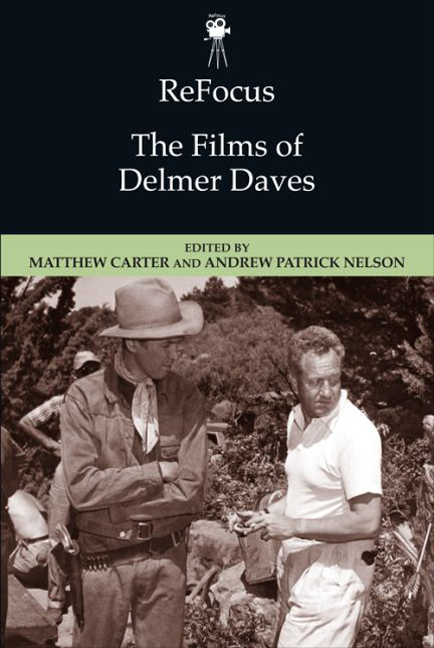Book contents
- Frontmatter
- Contents
- List of Figures
- Notes on Contributors
- Acknowledgments
- Introduction: “No One Would Know It Was Mine”: Delmer Daves, Modest Auteur
- 1 Don't Be Too Quick to Dismiss Them: Authorship and the Westerns of Delmer Daves
- 2 Trying to Ameliorate the System from Within: Delmer Daves’ Westerns from the 1950s
- 3 Bent, or Lifted Out by Its Roots: Daves' Broken Arrow and Drum Beat as Narratives of Conditional Sympathy
- 4 This Room is My Castle of Quiet: The Collaborations of Delmer Daves and Glenn Ford
- 5 Delmer Daves, Authenticity, and Auteur Elements: Celebrating the Ordinary in Cowboy
- 6 Home and the Range: Spencer's Mountain as Revisionist Family Melodrama
- 7 Delmer Daves’ 3:10 to Yuma: Aesthetics, Reception, and Cultural Significance
- 8 Changing Societies: The Red House, The Hanging Tree, Spencer's Mountain, and Post-war America
- 9 Partial Rehabilitation: Task Force and the Case of Billy Mitchell
- 10 “This Is Where He Brought Me: 10,000 Acres of Nothing!”: The Femme Fatale and other Film Noir Tropes in Delmer Daves’ Jubal
- Index
9 - Partial Rehabilitation: Task Force and the Case of Billy Mitchell
Published online by Cambridge University Press: 15 September 2017
- Frontmatter
- Contents
- List of Figures
- Notes on Contributors
- Acknowledgments
- Introduction: “No One Would Know It Was Mine”: Delmer Daves, Modest Auteur
- 1 Don't Be Too Quick to Dismiss Them: Authorship and the Westerns of Delmer Daves
- 2 Trying to Ameliorate the System from Within: Delmer Daves’ Westerns from the 1950s
- 3 Bent, or Lifted Out by Its Roots: Daves' Broken Arrow and Drum Beat as Narratives of Conditional Sympathy
- 4 This Room is My Castle of Quiet: The Collaborations of Delmer Daves and Glenn Ford
- 5 Delmer Daves, Authenticity, and Auteur Elements: Celebrating the Ordinary in Cowboy
- 6 Home and the Range: Spencer's Mountain as Revisionist Family Melodrama
- 7 Delmer Daves’ 3:10 to Yuma: Aesthetics, Reception, and Cultural Significance
- 8 Changing Societies: The Red House, The Hanging Tree, Spencer's Mountain, and Post-war America
- 9 Partial Rehabilitation: Task Force and the Case of Billy Mitchell
- 10 “This Is Where He Brought Me: 10,000 Acres of Nothing!”: The Femme Fatale and other Film Noir Tropes in Delmer Daves’ Jubal
- Index
Summary
William “Billy” Mitchell was an early military aviator whose 1925 court-martial caught the imagination of the American public. Born into a family of wealth and political influence, Mitchell nonetheless joined the military at the age of eighteen, distinguishing himself first during the Spanish–American War and, twenty years later, during the First World War, where he rose to the rank of Chief of the Air Service for the U.S. Army. During the early 1920s, Mitchell tirelessly advocated for the primacy of aviation in America's post-war military plans. He argued that airplanes would quickly become the primary military instruments of warfare, and that the nation would best be served by investing heavily in the design and manufacture of specialized aircraft. In order to demonstrate his ideas, he organized a series of high-profile tests and exhibitions, becoming a media darling and nationally famous in the process. He also made numerous enemies, particularly in the Navy, and was eventually court-martialed in what, at the time, was considered to be one of the most noteworthy trials in American history. He was forced out of the Armed Services and died, embittered, a few years prior to the start of the Second World War, a conflict that would prove nearly all of his theories to be sound and his prognostications correct.
Although in no way explicitly acknowledged, the central character in Task Force (1949), a film written and directed by Delmer Daves, espouses nearly all of Mitchell's core theories. This chapter examines the film's fictionalized treatment of a real-life figure, exploring the manner in which Mitchell is valorized—in that the film's central character advances the General's strategic arguments—while simultaneously being erased from history. As Task Force carries the narrative into the Second World War it showcases a heroic figure instead of a tragic one, situating the character at the crossroads of developing philosophies and missed opportunities in American interwar imperialism. Daves the director will also be examined, particularly for the cinematic qualities that suggest it is time to critically re-examine some of his forgotten films, such as Task Force. Finally, Daves’ treatment will be put in context with other aviation films from the same era, most notably Otto Preminger's The Court Martial of Billy Mitchell (1955), which, coming six years later, was able to openly examine the controversial figure.
- Type
- Chapter
- Information
- ReFocus: The Films of Delmer Daves , pp. 184 - 198Publisher: Edinburgh University PressPrint publication year: 2016



